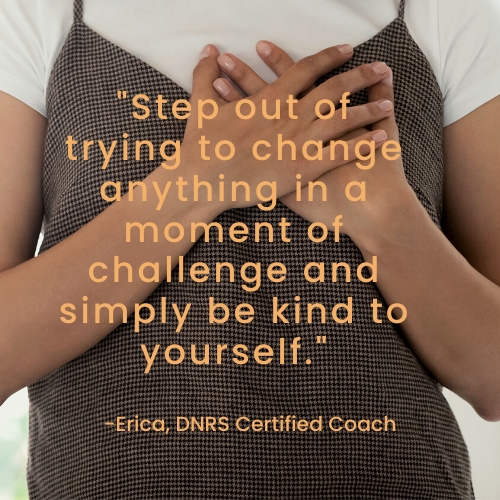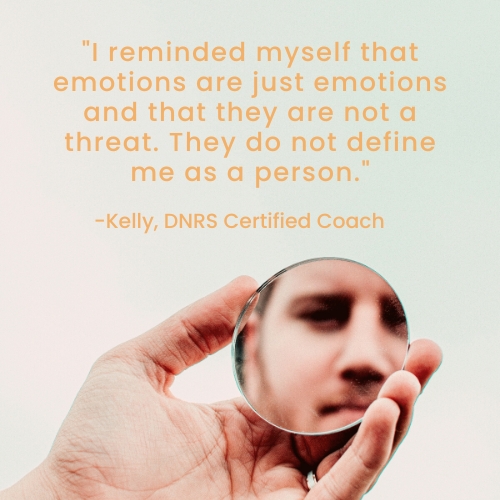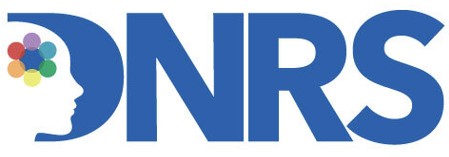Below, 10 of our Certified DNRS Coaches relate their personal experiences with facing down self-criticism during their healing journey. They then share advice about what helped them, and now their clients, practice the necessary self-compassion and self-love to fuel their recovery. These limbic system retraining tips will help you become your own BFF and heal faster.
Limbic System Retraining Tips: The Why & How of Self-Compassion
During the process of limbic system retraining, people may notice negative emotions rising up. Identifying and managing critical self-talk and limiting beliefs about yourself or the world around you is part of the process of healing. The practice of self-compassion and self-love corrects the neural pathways that are stuck in a constant fear response.
But stopping negative self talk in its tracks and putting self-love into practice doesn’t come naturally to many of us, least of all those with limbic system impairment. So, our coaches share their wisdom and experience to give you a leg up.
In their own ways, each coach addresses
- why self-compassion is so necessary in the healing process, and
- give away practical tips to help you learn and implement this invaluable skill.
Alita: Remember to Step Into the Curious Observer Role
As we rewire our brains, the ebb and flow of recovery can be challenging, not only physically, but emotionally as well. As these layers surface, we may experience negative emotions which can lead to guilt and self-criticism.
Our feelings in any given moment can be very convincing and feel like the truth. Understanding that emotions can sometimes be amplified with limbic system impairment helps us to remember to step into the curious observer role. Then we can identify emotional states that don’t support the healing process.
I help my clients spot the ways in which the limbic system can latch onto these emotional layers and keep old neural pathways firing. One approach is to be more gentle with ourselves, and more compassionate with our self-talk. Being your own best friend on this healing journey goes a long way in making it less stressful, and DNRS more successfully implemented.
Anysia: Lovingly Laugh At Your Critical Thoughts
What a relief it was to discover that the emotional layers of rewiring our brains is normal to experience as we retrain our limbic system! Just like I once was, clients are often taken by surprise when challenging emotions surface. Healing from both emotional and physical symptoms is like peeling away the layers of an onion and are all part of the process.
Emotions that showed up for me were guilt, shame, blame, and even anger.
Shame/guilt: “How can I be a good mother due to illness?”
Blame/judgement: I blamed loved ones and held on to events of the past then kept repeating them in my mind. The events I recalled were magnified/distorted due to limbic system impairment. I worried a lot about how I fit in. Was I good enough? Did I say the right thing? I remember staying up at night replaying conversations in my head that I felt could have gone better!
Anger: It showed up around smells, lights, and even things people would say. I was hypersensitive to my environment and people due to limbic system impairment.
In these moments, curiously observing, lovingly laughing at those thoughts, then redirecting to gratitude, compassion, and shifting focus were some of the tools that helped me the most.
Christine: Ask Yourself What Else Could Be True
It can feel unsettling when emotional layers surface while implementing the DNRS program. I always reassure my DNRS clients that this is common and often an encouraging sign that your limbic system is rewiring.
I remember in my own DNRS journey, becoming aware of feelings of shame that showed up as self-criticism and a sense of inadequacy. As the curious observer, I began noticing how often my thoughts did not serve me well or “tell the truth”. With limbic system impairment, often our emotions and limiting beliefs become amplified. As I rewired my brain, one of my favorite phrases when I noticed an unhelpful thought became, “What else could be true?” Over time, this question helped lead me to a shift in my thinking, which also led to different emotions and behaviors. As my brain rewired, my self-criticism turned to self-love and compassion.

Doris: Make a List, Check It More Than Twice
When I had limbic system impairment, I suffered from a myriad of physical symptoms, but it never occurred to me that there was also an emotional layer crying out to be healed. As I cultivated my Curious Observer, I noticed the overwhelming number of negative thoughts and emotions I’d been engaging in, including those of guilt and shame.
Early on in my journey, I reluctantly made the decision to quit my job, which resulted in a downward spiral of self-criticism, judgement and victimhood. Guilt for quitting my job culminated in shame for getting sick in the first place. Things began to shift, however, when I looked for the silver lining in my journey.
I made a list of all the qualities I loved about myself, placing special emphasis on those that had strengthened as a result of my journey. When my inner critic belittled me, I would simply pull out my list. This became a very useful tool to help me reframe the situation and shine a light on the truth of who I am.
As I began to change my negative self-talk and treat myself with more love and compassion, I became much happier and that translated into ongoing healing and progress. Helping my clients build their toolbox for self-compassion is one of the most meaningful aspects of my job.
Erica: Self Talk That Soothes Your Limbic System
Self-compassion and kindness can feel like the opposite go-to during limbic system retraining. It did for me anyway. I didn’t know how to be kind to myself, and it felt unimportant in the big picture.
Many of us are accustomed to living in shame, guilt, suffering, and needing to push through to survive. Self-kindness and compassion can feel like it won’t make a difference. The opposite is true: it is a powerhouse in the rewiring process!
Self-compassion strengthens and reinforces healthy new pathways and can bring us out of a trauma loop more quickly. It’s a soothing way of acknowledging the concerns of your limbic system while also teaching it to respond differently by firing up your new neural pathways.
A favorite statement to practice this comes from a dear client of mine, “I see why you’re doing this, and it’s okay.” I encourage you to try saying this, while placing your hand on your heart. Step out of trying to change anything in a moment of challenge and simply be kind to yourself. If it feels too simple or perhaps uncomfortable, it may be just what you need to practice.

Jana: Give Yourself Permission Not To Be Perfect
During my recovery using the DNRS program I began to work on letting go of perfectionism. The problem was that when I left a margin for making mistakes (for example, stopped re-reading emails 3 to 5 times before I sent them), I also opened the door to the shame and embarrassment I felt when I did mess up.
I realized the answer was not to be as perfect as possible to avoid making mistakes, but instead to give myself permission to be human. Humans make mistakes! So, when I felt the shame of a mistake creeping in, I would wrap my arms around myself in a hug and say, “It’s okay Jana, everyone makes mistakes sometimes. You are gracious to other people when they make mistakes, and you can be kind to yourself in this moment. Your value is not based on your performance. You are worthy of love and belonging.” Sometimes I would smile and add, “I am so proud of you for doing this important work!”
With practice and repetition, little by little, I began to believe it.
Karen: Redirect Self-Blaming Thoughts
When I was in recovery for mold illness, MCS, and more, I carried a lot of shame and guilt. Being a new mother, I could not comprehend nor accept the fact that I was not able to do what the other mothers in my community were able to do with ease: lift a stroller out of the trunk of a car and set it up, go to indoor baby gyms, or sit with ease in the new rocking chair with polyurethane padding while nursing my baby.
When I signed up for DNRS, one of the first things Annie told me was “It’s not your fault.” I remember tears of gratitude streaming down my face, and that simple sentence was a rock for me throughout my recovery. Whenever I started to go down the old self-blame pathway of “I’m a bad mom for being sick,” I would redirect with the words, “It’s not my fault.” It felt as though I was giving myself a big hug of appreciation and kindness, and I began to gain confidence simply because a part of me started to understand what it is to forgive. I forgave the mold, and I forgave myself.
Throughout the recovery process, I began to shed many more layers of guilt and shame. Becoming the Curious Observer was not an option and shifting my state of being was essential. Because of DNRS, I am a friend to myself. My own BFF.
Kelly: Normalize Emotion, Don’t Let Them Define You
When I first started DNRS, I was so focused on the physical layers of my impairment, that I hadn’t even considered the emotional layers. It was easy for me to show compassion for myself when it came to the physical layers. However, emotions involved with limbic system impairment such as anger, fear and sadness somehow felt as if they were my fault. I would chastise myself for having these negative feelings. Once I delved into the practice, I soon realized that the emotional layers were absolutely a part of limbic system impairment and oftentimes the ones most difficult to work through.
For me, I would go from feeling emotionally numb to angry quite quickly which would often result in feelings of shame.
What helped me the most with the emotional layers was to normalize the emotions and to let go of feelings of shame about having them whenever they came up. It was important for me to remind myself to treat my emotional “symptoms” the same way that I would treat my physical ones. This meant stepping into the place of the curious observer.
I reminded myself that emotions are just emotions and that they are not a threat. They do not define me as a person but rather were just the result of an overactive limbic system. Once I was able to step into the place of the curious observer and show myself kindness, compassion and patience, I noticed that the emotional “symptoms” gradually started to shift.

Linda: Face Down Self-Doubt
Are you doing DNRS but struggling to find the time? Do you find yourself pulled in too many directions? Do you put the needs of others before your own needs? If so, you are not alone.
Putting others first can be a deep-seated core belief and lead to emotions of resentment, guilt, and shame. In my recovery journey, these emotions arose when self-doubts of being a “good mom…a good wife…and a good daughter” came up.
As I retrained my brain, I reframed these negative limbic system messages with examples of what else I knew to be true: that I was good in these roles. With time and practice, I learned that by taking care of myself, I was modeling good self-care and self-compassion. I became a “good me “so that I could be a better mom, wife and daughter.
Riley: Write a Compassionate Letter To Yourself
Emotional layers such as shame and guilt show up for many of us while implementing DNRS. Although this is a common experience, it can feel challenging to know how to address these layers within the context of the program. During my own recovery, I often wondered if I could still rewire my brain when certain negative emotions felt so strong and compelling.
Over time, however, I began to realize that I didn’t have to outmuscle or overpower these negative emotions in the moment in order to continue healing. Our brain is a pattern recognition organ; therefore, each time we provide it with a new message, we begin to tip the balance in our favour, whether we feel change in the moment or not.
Acts of self-compassion provide our brain with an opposite message to guilt and shame.
Writing a compassionate letter to yourself as you would to a dear friend or loved one, is a strategy that I love to share with my clients. It is often easier to be compassionate with others, so this exercise can be a gentle way to begin opening the door to compassion for yourself. In time, these new messages build healthy new pathways in the brain, and lead to a new experience – one of self-love, kindness and acceptance.
Get More Limbic System Retraining Tips
The DNRS program is a tried-and-true program that will teach you how to retrain your limbic system to generate physical healing. Our Certified DNRS Coaches help clients when they need additional support implementing the program in their lives.
Besides this resource, DNRS Founder, Annie Hopper, shares free limbic system retraining tips every month in her “Annie’s Insights” email newsletter. Click here to sign up for Annie’s email newsletter to inspire and accelerate your healing journey.

